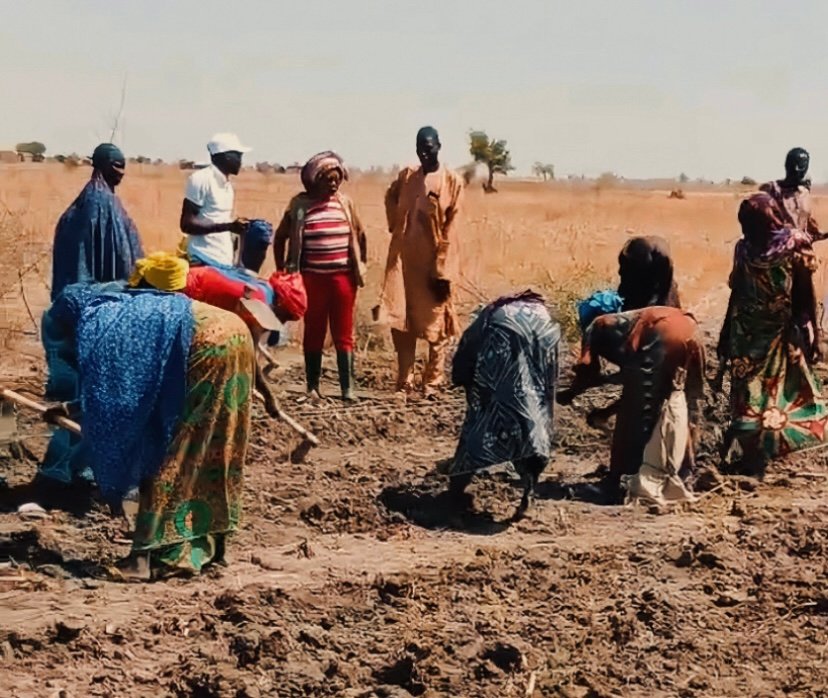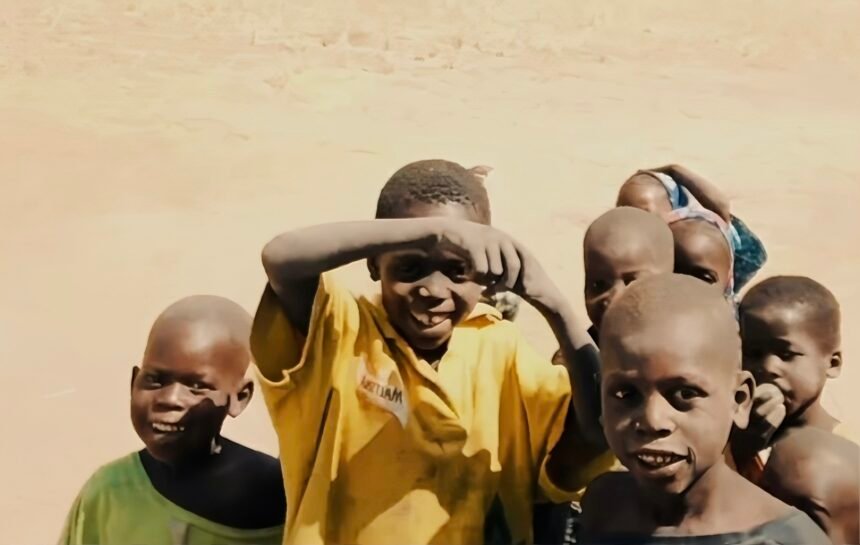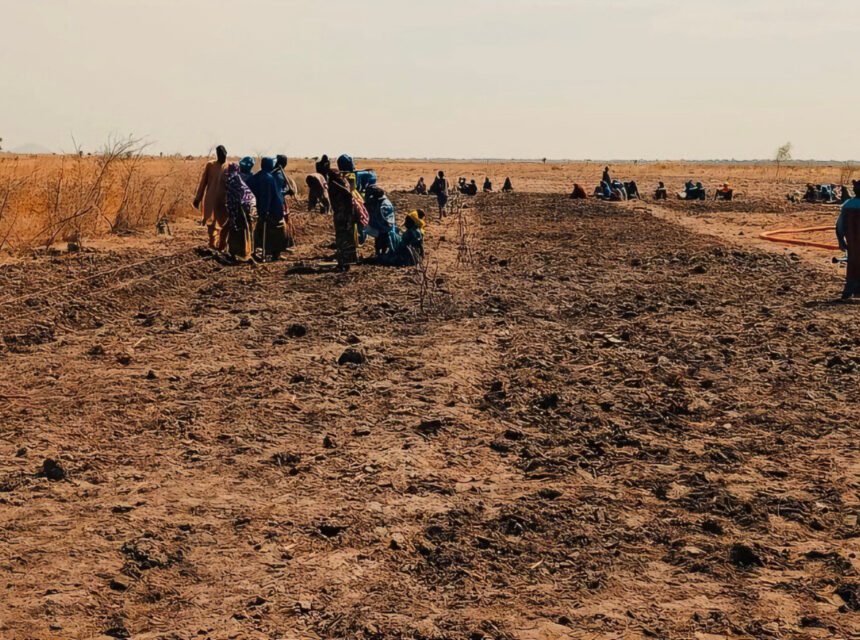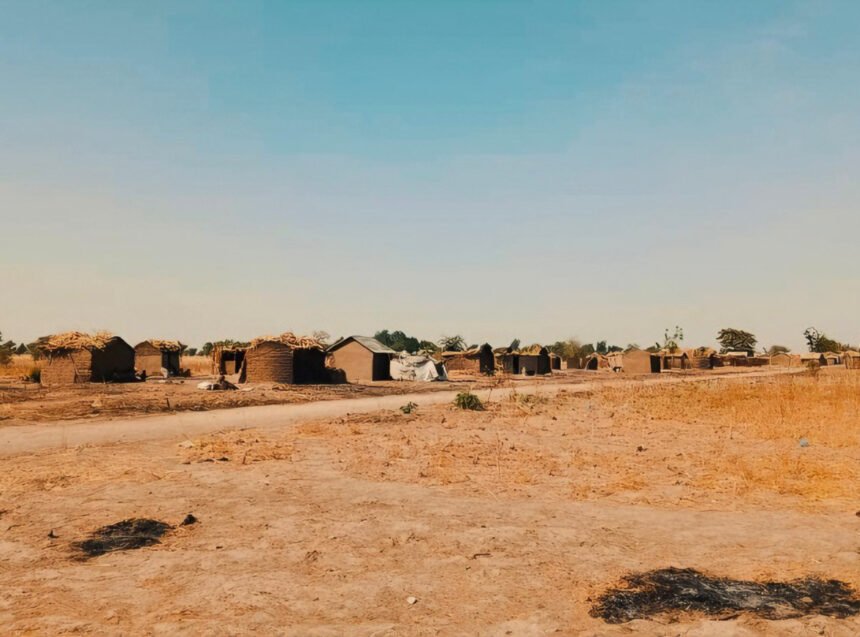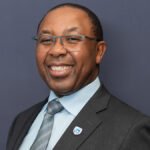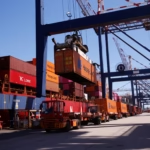They fled Boko Haram terror, only to discover state abandonment. In an unmapped Cameroon camp, women farm under constant threat while their children are born stateless. But their greatest enemy isn’t terrorism. Our three-day investigation exclusively reveals how bureaucratic erasure kills more quietly than bullets.
My husband tried to protect us. He was the first to fall.
Aïssata
A detonation rips through the silence. A strangled cry. Violence, their first caress of the morning. A woman holds her daughter against her chest. 1,300 kilometers away, under the soft spotlights of an air-conditioned room, the Minister of Defense adjusts his microphone and declares, his voice composed: “The situation is under control.”
Aïssata counts her own. One, two, three… seven names whispered into the folds of a worn wrap. Seven faces on which she has thrown earth, her hands tired from having dug too many graves.
Two worlds. One single forgotten reality.
The Day Life Was Interrupted
“It was a Thursday. they came before dawn”, Aïssata recalls, her fingers run over the fabric of her boubou, tracing invisible patterns. A nervous hand, haunted by the past. Silence settles between us, thick as the dampness of this arid land. “My husband tried to protect us. He was the first to fall”, she added.
Dust dances. A cruel beauty, suspended in the air. “We dug seven graves. Then we left.” At this moment, Aïssata is no longer a woman. She is an unfinished prayer, a wound that still breathes. She no longer cries. Her body, dry like the earth she cultivates, has exhausted its tears.

According to the latest data from the International Organization for Migration (IOM), 475,871 people were displaced in the Far North of Cameroon since 2014. Aïssata is now just a statistic. But behind each number hides a story similar to hers.
An Unofficial Displacement Camp
The Aldjé camp is a rumor to many, difficult to locate on maps. Official reports seem to skirt around it with the precision of a calculated silence. “We are legal ghosts”, whispers Falmata, an ironic smile on her cracked lips. The word “ghost” slips out, reaches the air before dissipating.
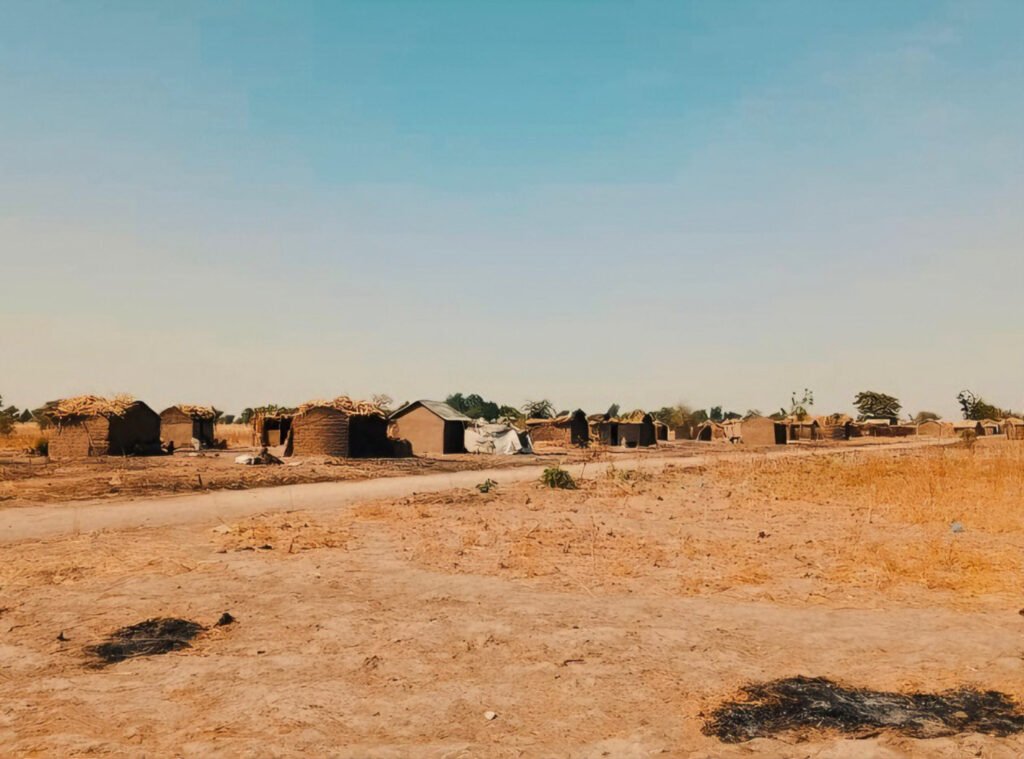
In this locality where Boko Haram attacks have continued regularly for more than ten years, hundreds of people survive in a precarious collection of makeshift shelters. Here, the army arrives only in convoy, when officials deign to cross this forgotten land. Here, the lookouts are barefoot teenagers, messengers of a war that does not speak its name.
“The last attack?” She raises an eyebrow. “Three weeks ago. Six shelters burned. But you want an exact date?” She laughs, hoarse, acidic. “While everything is blurry for them, they want us to be precise”.
The Earth as a Desire to Exist
5:17 AM.
Dawn unravels, revealing shadows bent under the weight of water basins. The step supple, silent. Like felines stalking hope, hips rhythmed by the walk. The sun climbs, insatiable, suffocating skin and hearts. “We cultivate in shifts. One group works, the other keeps watch. We’ve learned at the school of survival.” Hauwa, 32, two children, speaks while scanning the horizon. Her cracked hand brushes the cracked ground, tenderly touching a fragile sprout. An almost maternal gesture, a pact with life. “The land here is difficult, but we’ve learned to work it.”
The men, though fewer in number, are not completely absent. “Three were gunned down in the fields not long ago,” adds Hauwa. A shiver slides across her skin, imperceptible. A woman turns around abruptly, shoulders tense. In the air, the scent of danger.
Those who remain provide their support in a discreet but essential manner. We see them, bent under the weight of motorized pumps, installing them during the least risky hours, collecting the precious water that will nourish the crops. A silent solidarity that plays out on the margins of terror.
A local initiative secured 25 millions FCFA ($40. 984) from CBC Bank, with technical support from the World Food Programme. These funds financed two boreholes and motorized pumps. Under anonymity, a WFP agent we met confirms this funding but admits that “it’s a drop in the ocean compared to the region’s needs. These informal camps represent a challenge, with attack risks being high.”
Survival economy
There, everything is whispered aloud. Glances are furtive, exchanges hushed. Aïssata displays her kola nuts, meager witnesses of a bygone past. “Before, I had a real stall. Today, I have this left.”
A slow movement. A hand that brushes hers while handing her a few coins. A transaction, but also human contact, a sign of life in this region sacrificed by fate. Money here doesn’t flow, it’s wrenched away. 72% of displaced people live from odd jobs. This cold figure translates concretely into chronic food insecurity.
Worn hands, tired bodies, empty stomachs. “Some days, we don’t eat. But the children are our priority, they must always eat first.” A rule, a daily sacrifice. Official data confirms this precariousness: 46% of displaced people in the region declare an urgent need for food.
“Our tontine,” explains Falmata, detailing the informal banking system they have established. “We use tontines to help each other keep our small shops going,” She added.
Memory as a Territory
Under the palaver tree, Maimouna, 71, whispers the names of disappeared villages. An oral cartography of lost places. A whispered heritage, engraved in the minds of children born in wandering.
“They must know where they come from,” says Amina, her face streaked with an old burn, nods. “The nearest school is kilometers away. The journey is too dangerous for children alone. We organize classes ourselves, with the meager knowledge we possess.”
According to the IOM, 40% of displaced children are in school in the region. A figure difficult to verify in Aldjé, as most of the displaced children have never been to school. “Many were born here, in flight. Without this transmitted memory, they would have no identity,” she adds.
She absently strokes the head of a little boy, perhaps her son. Or that of a disappeared sister. Here, every woman can name a death. “My brother was taken by Boko Haram two years ago. We don’t know if he’s alive or dead.” This permanent uncertainty is an additional wound.
A Systemic Failure
We asked for explanations. The authorities responded in administrative jargon. “These informal settlement areas pose a complex administrative problem. Without administrative existence, they cannot receive public services. It’s a vicious cycle that’s difficult to break out of”, confides an anonymous official.
A vicious cycle where the absence of identity condemns these women to invisibility. In the Aldjé camp, no public service is accessible. No running water, no electricity, no health post. Data collected by the IOM indicates that 27% of displaced persons in the Far North have no access to any public service within a 30-minute walk.
“My daughter was born here. For the State, she doesn’t exist. How can she go to secondary school? Work? Have rights?” laments Falmata, her baby at her breast.
A cold assessment, a guillotine. Without papers, no school. No school, no future. Oblivion, institutionalized. “We often hear promises on the radio,» she notes bitterly. «But the only official people we see are the soldiers who pass by furtively.”
These women live in the shadow of this system that desires them invisible. Their children are born without civil status, creating a generation of invisible citizens. IOM figures that 57% of internally displaced people struggle to obtain identity documents. This lack of documentation traps these populations in a cycle of exclusion that perpetuates itself.
Three Days in Aldjé’s Blind Spot
Our journey to Aldjé required days of preparation and tacit complicity with local fixers. From Maroua, capital of the Far North, two hours of road led us through military checkpoints, abandoned villages, and a heavy silence that seemed to await our passage.
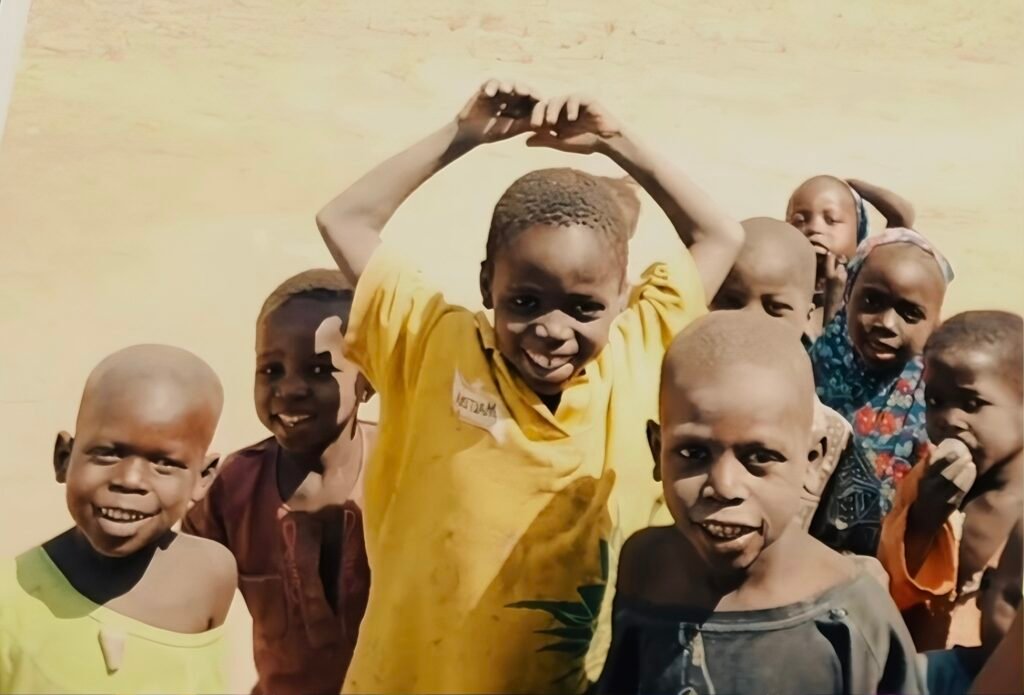
Upon our arrival, an unexpected scene: children, bodies and faces covered in dust, appear like apparitions before us. Their worn clothes, their bare feet marked by the arid earth have done nothing to diminish their joy of living. They cluster around us, their eyes bright with curiosity, their laughter resonating like an improbable melody in this infernal landscape.
They take our hands, improvise a dance, pull us into their whirlwind of innocence. This striking contrast between their precarious situation and their ability to celebrate the present moment strikes us straight to the heart.
The welcome at the camp was initially tinged with mistrust, then transformed into a striking hospitality, like an invitation to penetrate the intimacy of their pain. We slept in one of the shelters consumed by Boko Haram. At night, the sounds of the bush mingled with human whispers, these intertwined sounds like suspended caresses, punctuated by the furtive cries of children.

Some women refused to be photographed or recorded. The fear of the invisible, of Boko Haram infiltrators, prowled like an insidious presence. “You are our voice now,” confides Falmata during our last evening. “Don’t forget us when you go back. So many humanitarian workers have come, promised to return, and we are still waiting.”
These words, spoken in the shadow of an unkept promise, resonate with the weight of injustice. Being forgotten is a second death, more painful even than the attacks that made them flee. It is this suffering, this violated intimacy, that becomes the fuel for their resistance. Being forgotten constitutes a second death that they fear almost as much as the attacks.
On the second day, as we were heading toward the fields, a series of detonations tore through the air. Gunshots, first in the distance, a possible Boko Haram attack. Within seconds, the camp transformed. A choreography of survival unfolded, perfected through months of threat. Women abandoned their tasks, grabbed the youngest children, and rushed toward shelters. Muffled cries, brief orders shouted in all directions.
We stood frozen, smartphones in hand, awkwardly attempting to film this brutal reality that had erupted into our reporting. Two young boys appeared out of nowhere, running toward us breathlessly. They called out to us in the local language, seemingly indicating we should stop filming. Their faces were masks of adult determination plastered on childlike features.
They guided us, almost pushing us, toward a half-collapsed hut at the edge of the camp. There, hidden in darkness with a few others, we heard the gunfire gradually recede. “This isn’t a real attack,” whispered an old woman crouched near us. “Just a warning. If they wanted to kill us, we would already be dead.”
We remained this way for nearly an hour, in forced proximity with the daily anguish of these displaced people. When we finally emerged, life had already resumed its course, as if nothing had happened. The women had returned to their tasks, a few men talked in hushed voices. “Now you understand,” Falmata said simply as she passed us. “This is our normal.”
Later, we would learn that this “minor skirmish” was considered too insignificant to alert authorities or appear in any official report. Humanitarian aid, when it reaches them, collides with this bureaucracy of oblivion. Without papers, no registration. Without registration, no official aid. “NGOs come sometimes. But without official recognition of our camp, their aid remains sporadic and insufficient.”
The Seeds of Resilience
Later, as if nothing had happened, the women distribute seeds. Small packets, fragile carriers of suspended hopes, passing from hand to hand, almost like shared secrets. “These seeds represent our future,” confides Aïssata, her voice filled with this uncertain certainty. “As long as we can sow, we will exist in some way.”
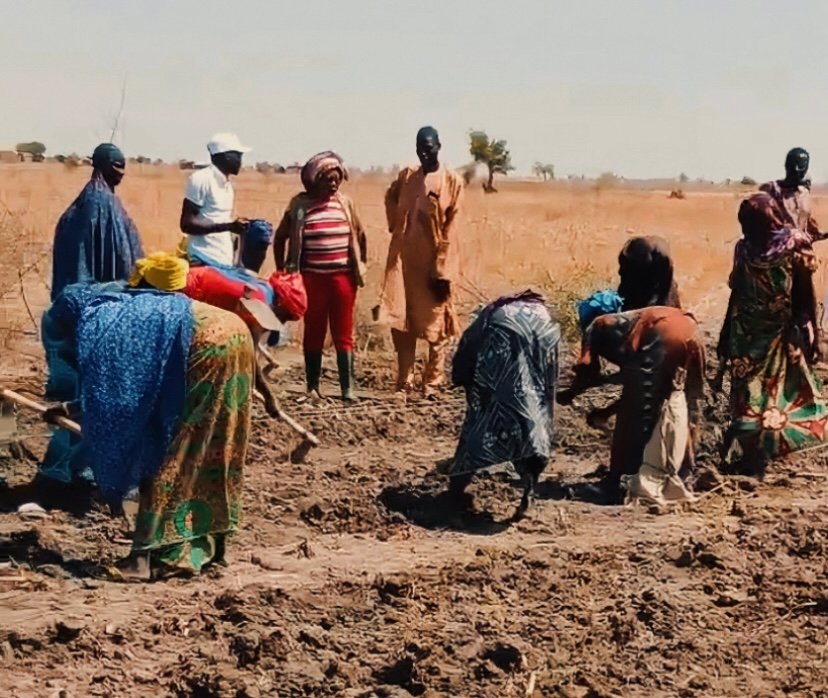
An autonomy that, nonetheless, remains precarious. The 25 million FCFA obtained for agricultural equipment only covers the surface of the need. It’s an ephemeral promise, a semblance of security, while a mountain of challenges still awaits.
“We would need at least three times more to properly equip all the plots and secure our production in the long term,” specifies a WFP humanitarian under anonymity, the words weighing like an unformulated warning.
This resilience is not that of the major conferences where they talk about “empowerment” and “climate resilience” in a distant reality. It is palpable, concrete. Brutal, almost violent in its truth. An act of survival, a silent challenge to a system that ignores them, but which, beneath the surface, harbors a powerful desire to be reborn.
Existence as a Political Act
Before our departure, Aïssata guides us to her plot at the edge of the camp. A hard, inhospitable land, but scratched with hope. She smiles, a powerless smile, but standing. “God willing, we will harvest. Unless…” A heavy silence. A suspended moment, like a held breath. Unless a new attack emerges from the shadows. Unless the drought becomes more cruel, the effects of climate change finish what violence has begun. Unless equipment runs short. “But we will start again. We always start again.”
These women, invisible in the eyes of the State, embody a resistance as powerful as it is discreet. Their existence, silent but stubborn, defies institutional abandonment and the brutality of armed groups. To love, to cultivate, to educate, to heal, in this context, becomes an act of rebellion.
Vulnerabilities of Displaced Women in Cameroon
As we leave the camp, the routine resumes, almost imperceptible: sifting millet flour, repairing shelters, watching children, preparing meals. Daily gestures, but charged with a heavy political message, a gentle pressure against violence, but inexorable.
“Will you come back?” Aïssata’s question, posed with an almost heartbreaking fragility, carries the weight of the invisible. An entire community suspended on the promise that their story will not drown in oblivion.
This investigation was conducted by i-30s Investigation as part of our series on resilient communities facing forgotten crises. All quotes have been translated from their original languages where necessary. For security reasons, the names of participants have been changed. We spent three full days in the Aldjé camp, conducted 15 interviews and group discussions. Several interview requests were addressed to local and national Cameroonian authorities. Most remained unanswered.



